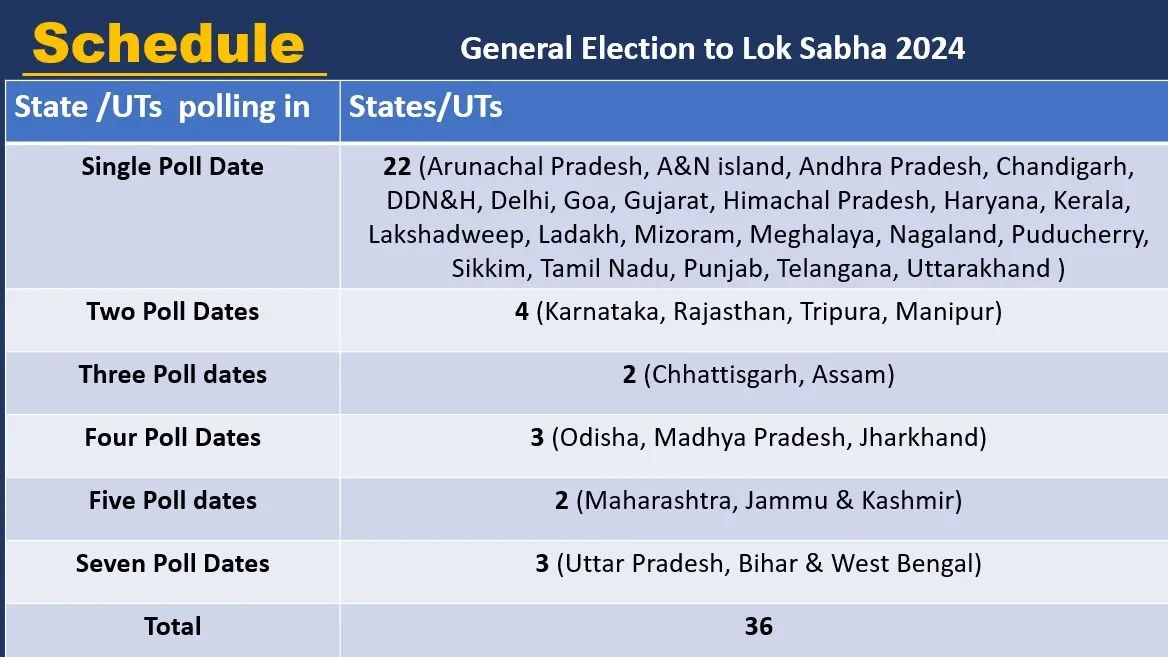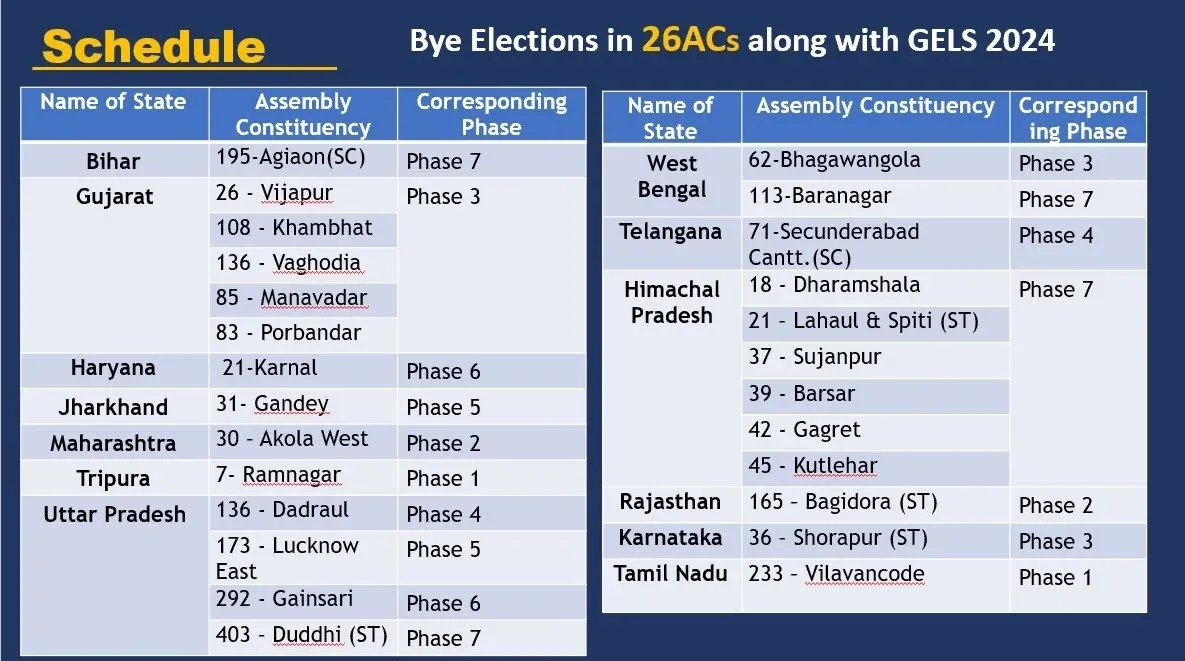Lok Sabha elections 2024 dates: Voting in 7 phases from April 19, results on June 4; check schedule
Upstox
7 min read • Updated: March 16, 2024, 6:51 PM
Summary
Lok Sabha election dates: The Election Commission has released the schedule of the upcoming general elections. The polls will be conducted in seven phases, from April 19 to June 1. The counting of votes will be held on June 4. Among the key metro cities, all parliamentary seats of Delhi will go to polls on May 25, whereas the voting will be held on May 20 in the constituencies of Mumbai.

Lok Sabha election dates announcement LIVE: The Election Commission (EC) on Saturday, March 16, declared the schedule for the upcoming Lok Sabha elections, which are held once in five years to elect the central government. The polls will be held in a total of 543 assembly constituencies, in seven phases between April 19 and June 1.
Along with the general elections, the polls in the four state Assemblies of Andhra Pradesh, Odisha, Arunachal Pradesh and Sikkim would be conducted simultaneously. The results of all the elections will be out on June 4, when the EC has scheduled the counting of votes.
Timetable of Lok Sabha polls 2024
The polling will be conducted in seven phases starting from April 19. The final round of voting will be held on June 1, and the counting of votes has been scheduled on June 4, the EC announced.
Here's a look at the phase-wise polling dates:
- First phase: April 19
- Second phase: April 26
- Third phase: May 7
- Fourth phase: May 13
- Fifth phase: May 20
- Sixth phase: May 26
- Seventh phase: June 1
In 21 states and union territories (UTs), the voting will be held in a single phase. In four states -- Karnataka, Rajasthan, Tripura and Manipur -- the polls will be conducted in two phases.
In Chhattisgarh and Assam, the voting will be held in three rounds; and four rounds of polling will be conducted in Odisha, Madhya Pradesh and Jharkhand.
In Maharashtra and Madhya Pradesh, the voting will be conducted in five rounds, whereas the maximum round of voting, 7, will be held in the states of Uttar Pradesh, Bihar and West Bengal.

When will voting be held in metro cities?
All seven Lok Sabha segments of Delhi will go to polls on May 20, whereas all the seven key parliamentary constituencies based in Mumbai region, along with neighbouring Thane, are slated for polls on May 25.
The voting in the Lok Sabha seats that come under Bengaluru and Kolkata regions will be held on April 26 and June 1, respectively.
State-wise polling dates
A total of 102 constituencies across 21 states/UTs will be go to polls in the first phase of the elections, on April 19. They include:
- All 39 seats in Tamil Nadu, 12 in Rajasthan, 8 in Uttar Pradesh, 5 each in Assam and Maharashtra, 4 in Bihar, 6 in Madhya Pradesh, 2 each in Manipur, Meghalaya and Arunachal Pradesh, and 1 each in Chhattisgarh, Mizoram, Sikkim, Nagaland, Jammu & Kashmir, Tripura, Lakshadweep, Andaman & Nicobar and Puducherry.
In the second phase of voting, scheduled on April 26, a total of 89 seats across 21 states/UTs will be contested. They include:
- All 20 seats in Kerala, 13 in Rajasthan, 14 in Karnataka, 8 each in Maharashtra and Uttar Pradesh, 5 each in Assam and Bihar, 3 each in Chhattisgarh and West Bengal, and 1 each in Jammu & Kashmir, Tripura and Manipur.
In the third round of voting, 94 seats across 12 states/UTs will be contested on May 7. They include:
- All 26 seats in Gujarat, 11 in Maharashtra, 14 in Karnataka, 10 in Uttar Pradesh, 8 in Madhya Pradesh, 7 in Chhattisgarh, 5 in Bihar, 4 each in Assam and West Bengal, 2 each in Goa and the UT of Dadra and Nagar Haveli & Daman and Diu, and 1 in Jammu & Kashmir.
The fourth round of voting will be held on May 13 in 96 seats spread across 10 states/UTs. They include:
- All 25 Lok Sabha seats in Andhra Pradesh, 17 in Telangana, 13 in Uttar Pradesh, 11 in Maharashtra, 8 each in Madhya Pradesh and West Bengal, 5 in Bihar, 4 each in Jharkhand and Odisha, and 1 in Jammu & Kashmir.
In the fifth round of elections scheduled on May 20, a total of 49 seats across 8 states/UTs will go to polls. They include:
- The remaining 13 seats in Maharashtra, 14 seats in Uttar Pradesh, 7 in West Bengal, 5 each in Bihar and Odisha, 3 in Jharkhand, and 1 each in Jammu & Kashmir and Ladakh.
In the penultimate round of polls scheduled on May 25, a total of 57 seats in 7 states/UTs will be contested. They include:
- All 10 seats in Haryana, 8 each in Bihar and West Bengal, 14 in Uttar Pradesh, 6 in Odisha, 4 in Jharkhand, and all 7 seats in Delhi.
The remaining 57 parliamentary seats, spread across 8 states/UTs, will be contested in the final round of polls on June 1. They include:
- All 13 seats in Punjab, 13 seats in Uttar Pradesh, 8 in Bihar, 9 in West Bengal, 1 in Chandigarh, 6 in Odisha and 4 in Himachal Pradesh.
Assembly elections to be held simultaneously in 4 states
Assembly elections in Andhra Pradesh, Sikkim, Odisha and Arunachal Pradesh will be held simultaneously along with the Lok Sabha elections, the EC said.
Andhra Pradesh has a total of 175 Assembly seats, Odisha 147, Arunachal Pradesh 60 and Sikkim has 32 constituencies. Here are the state-wise polling dates:
- Arunachal Pradesh and Sikkim: April 19
- Andhra Pradesh: May 13
- Odisha: May 13 and May 20 (two phases)
A total of 26 Assembly by-elections in several states will also be conducted simultaneously along with the parliamentary polls in those constituencies.

55 lakh EVMs to be used for general elections
A total of 55 lakh electronic voting machines (EVMs) will be used to conduct the general elections, CEC Rajiv Kumar said, adding that approximately 10.5 lakh polling stations would be earmarked.
The Commission also noted that 1.5 crore polling officials, along with 4 lakh vehicles, would be deployed for the electoral exercise.
Term of 17th Lok Sabha to expire on June 16
The term of 17th Lok Sabha or the Parliament's Lower House will expire on June 16, 2024, the CEC said. This means that the electoral exercise needs to be completed, and the elected government needs to take charge before the aforementioned date.
The terms of the Legislative Assemblies of Andhra Pradesh, Odisha, Arunachal Pradesh and Sikkim are also due to expire in June 2024, Kumar added, further noting that elections are also due in Jammu & Kashmir. However, the polls were not announced for the J&K Assembly.
Number of voters in 2024 Lok Sabha elections
A total of 96.8 crore Indians are eligible to cast their votes in the upcoming Lok Sabha polls, the EC said. This is higher as compared to 89.6 crore voters who were eligible to vote in the 2019 elections.
The total number of eligible male voters has come in at 49.7 crore, higher than 46.5 crore voters in 2019. Similarly, the number of eligible female voters has increased to 47.1 crore from 43.1 crore in the previous elections. In 12 states, the ratio of women voters is higher than men voters, Kumar said.
The first-time voters in the 18-19 age group has increased to 1.85 crore, from 1.5 crore in the last general elections, as per the data shared by the polling body said.
Recap of 2019 Lok Sabha polls
The voting was held in seven phases in the last general elections, which was lower as compared to the nine rounds of voting conducted in 2014.
A total of 89.6 crore Indians were eligible to vote in the last elections, and the overall polling percentage had came in at 67%. The EC had scheduled the voting in 16 states and one union territory in a single phase, whereas the polls were conducted in multiple rounds in the larger states.
In Maharashtra, Madhya Pradesh, Odisha and Jharkhand, the polls were held in three phases, whereas a total of seven phases of voting were conducted in Uttar Pradesh, Bihar and West Bengal.
The entire voting exercise lasted for around 40 days in 2019, stretching from April 11 to May 19. The results were declared on May 23. The elections were held at an estimated cost of $8 billion or ₹55,000 crore, as per the Centre for Media Studies.